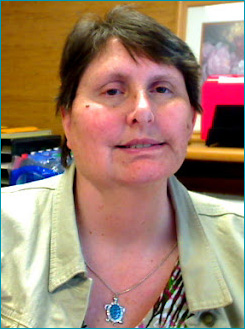Teresa Rogers: Her Words (Captions) Rang Out Loud and Free

March 9, 1962 – October 22, 2014
For I have learned from Fancy's artisan
How written words can thrill the inner ear
Just as they move the heart, and so for me
They also seem to ring out loud and free.
The written words that most thrilled DCMP's Teresa Rogers were captions. As a little girl, she loved films and television, but being deafened in 1966, at age 4, by encephalitis, she found them difficult to understand. She sat on her father's lap watching TV, doing the best she could to understand it, as closed-captioning was not available during most of her childhood.
However, the residential school she attended in South Carolina (SCSDB) housed captioned films from the newly established federal program named Captioned Films for the Deaf (CFD). Her heart was moved by many of the titles, and she smilingly related how Brian's Song was the first (of many) captioned movies to make her cry. She could not recall the title, but the first educational captioned film she saw was about science.
She loved CFD (now DCMP), and naturally leaped at the chance to come and work for the program as captioning editor in 1994. She was ready for the job, having honed her language skills at Gallaudet University and subsequent teaching assignments at SCSDB. She remained in the DCMP position until illness forced her to leave shortly after celebrating her 20th work anniversary in June of this year.
For two decades she advocated for consistency and quality in captioning, and provided leadership for the development of captioning guidelines (the Captioning Key) which still remain a standard in the United States. She also proofed and edited captions on hundreds of videos that have positively impacted the lives of tens of thousands of children and adults who are deaf and hard of hearing throughout the nation.
As she wrote five years ago: "I have long advocated for consistency and quality in captioning. I have spent the last 15 years monitoring captioning errors and omissions in educational materials as well as in movies, television, and other forms of media. I have observed that both children and adults who are deaf or hard of hearing are often deprived of the opportunity to access, analyze, learn, evaluate, and fully participate in the mainstream of American culture because of the lack of captioning or faulty presentation of it. Captioning is essential to acquiring information and thriving (even surviving) in our society."
Teresa, the captioning artisan, taught us much, as she made sure the printed words rang out loud and free. We thank her for all she meant to us and the people we serve.